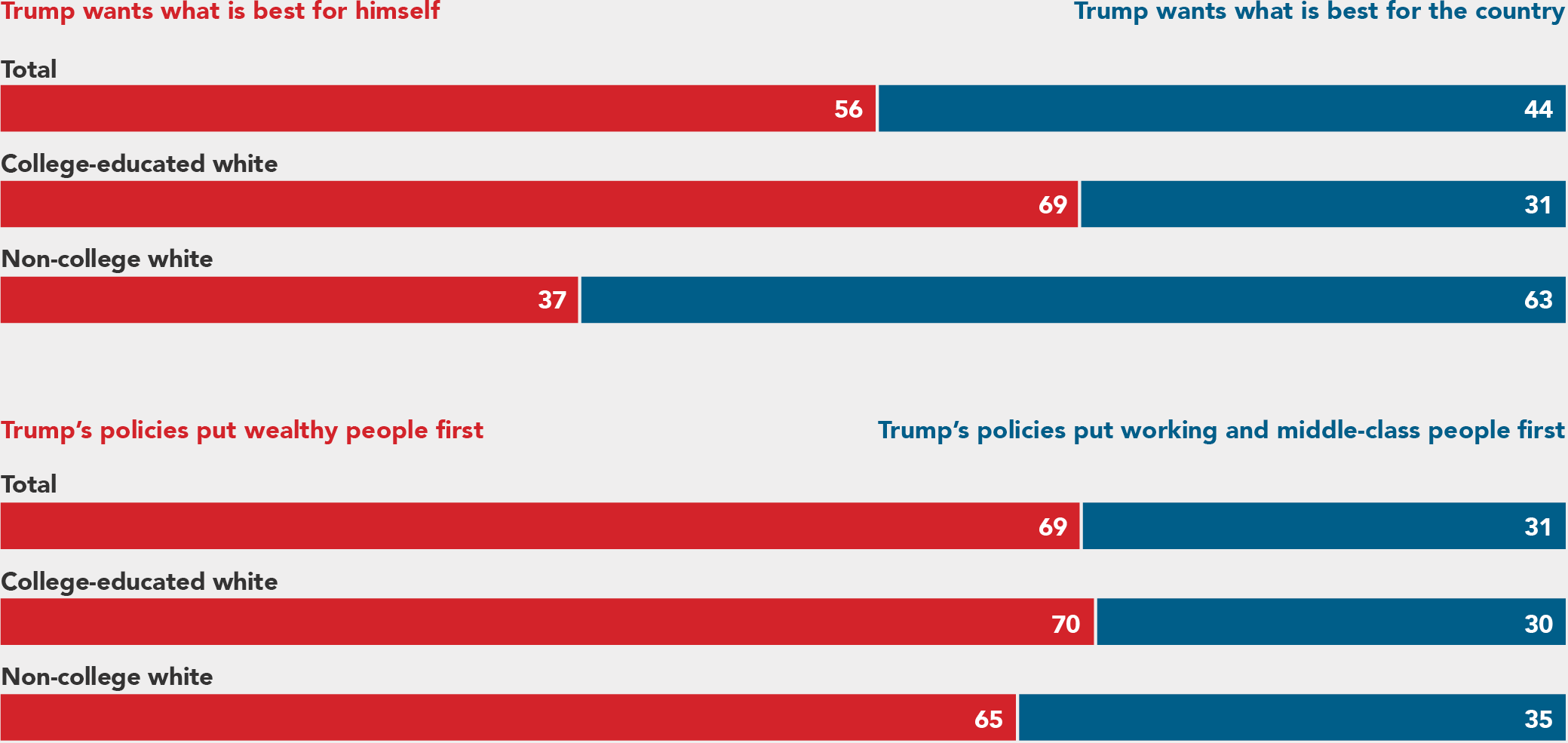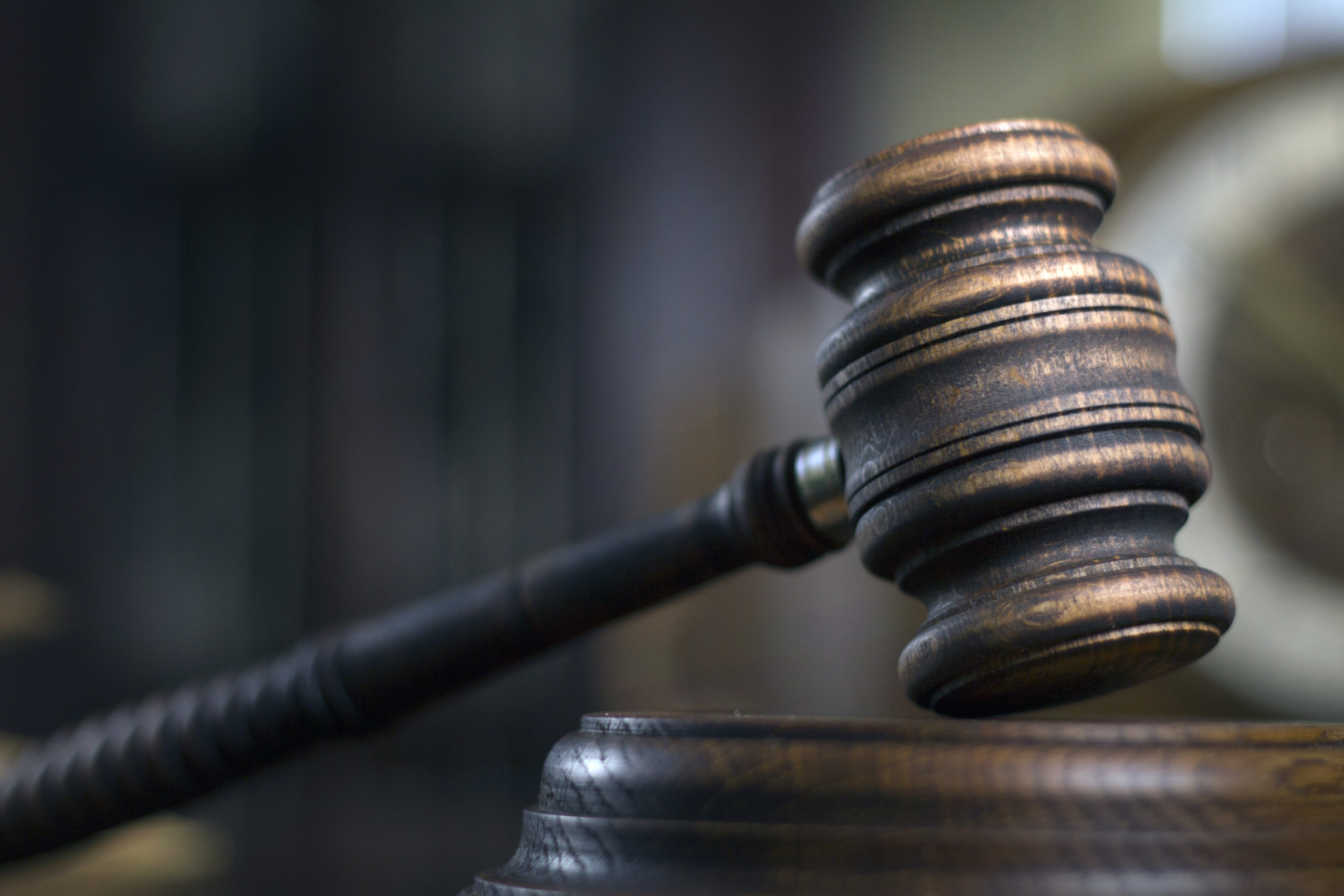Topic 1: How should Democratic policy-makers talk about their new package of reforms?
Americans believe House Resolution 1, a package of reforms proposed by the incoming House majority, addresses real problems with the political system. Direct language about what the legislation will do, and how it will impact political behavior today, resonates more than language about reforming democracy itself.
Topic 2: Who do Americans believe is getting the most out of the economy?
The economy still gets positive marks, but there is trouble beneath the surface for the Trump administration, as Americans are far more likely to believe Trump has helped wealthy people and corporations than believe he has helped regular people like them.
Topic 3: What are the public’s biggest concerns coming out of the Special Counsel investigation?
One thing hasn’t changed since May of 2018: some of the most troubling aspects of the Special Counsel investigation for many Americans have little to do with rehashing 2016, and everything to do with allegations that Trump obstructed justice and tried to cover up the truth.
1 | Government 2.0
Most Democrats think democracy is broken. Most everyone thinks Washington is broken.
House Resolution 1 (or HR1), a package of reforms that is Democrats’ first priority in the 116th Congress, includes a host of measures to improve the integrity of government and elections such as improving voting access, reforming campaign finance laws, and creating greater government transparency. It has been billed by lawmakers and advocates as a “democracy reform” bill, but that description alone may not speak to Americans’ deepest concerns about political problems facing the United States today.
In a split-sample experiment, half of respondents are asked if “American democracy” is broken and half are asked if “our government in Washington” is broken. Most Americans answer “yes” to both questions, but there is much wider agreement on the latter, where the language is more specific and, perhaps, puts more onus on our current leaders than on our underlying democratic institutions. People see the problem as the officials in our government, not the government itself.
Democrats are much more worried about the state of American democracy (72%) than Republicans (54%) or independents (55%), but even just one in five Democrats say American democracy is “completely” broken (19%). When it comes to our government in Washington, over four in five Americans (82%) from all partisan affiliations say government is broken and a majority of independents (51%) say it is “completely” broken, more than Democrats (38%) or Republicans (44%). Washington is the problem and the enemy here in need of reform, not the country itself.



Americans see real problems addressed in HR1, but proponents must work to build credibility on these issues.
With HR1 new, evolving, and complex, few had heard of the bill (85% had heard little or nothing when we fielded the survey in mid-December). However, some of the measures may pique Americans’ interest more than others. Americans feel most strongly about addressing election security and integrity, oversight of election spending, and ethics enforcement for public officials.
Though the public sees these measures addressing real issues, one ongoing project for HR1’s supporters will be establishing credibility. This survey finds Democrats in Congress are somewhat more trusted than their Republican counterparts to rein in the influence of campaign donors (36% to 23%) and stand up to powerful corporations and lobbyists (38% to 22%), but in many cases, in the areas directly addressed by HR1, Americans are reluctant to say Democrats have a lot of credibility. In fact, when asked to choose the topics on which Democrats have the most credibility from a long list of reforms such as improving voting access and fortifying ethics laws, a plurality of independents say they don’t. Democrats in Congress have a lot of messaging work to do if they want to be reliably perceived by the average American as the party of good governance.
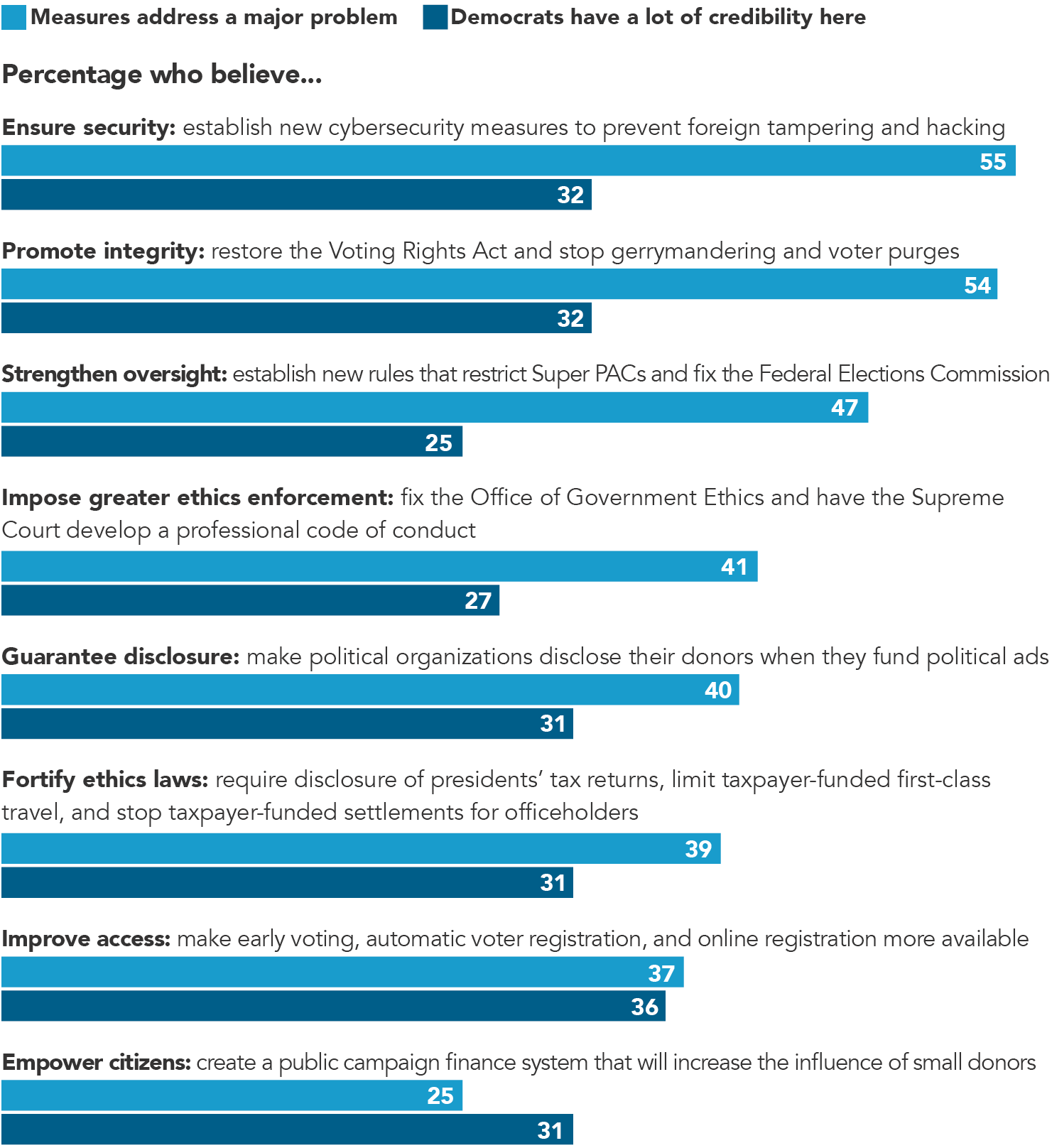
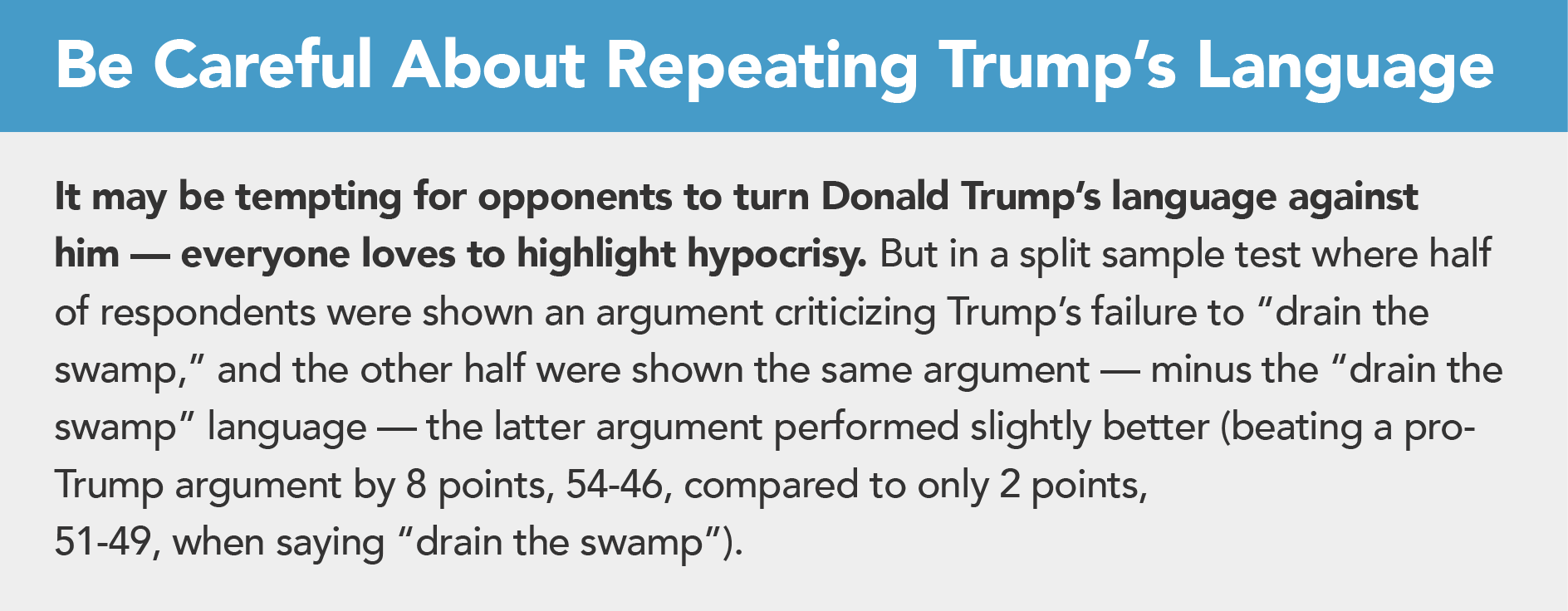
Direct language on money in politics and corruption breaks through.
HR1 also aims to tackle political corruption and the growing influence of big money in politics. On these issues, the language that connects best with Americans speaks directly to the problems rather than the process: holding politicians accountable, stopping political corruption, reducing the influence of big money in politics, increasing transparency in government.
Some language that is less effective includes: Reforming campaign finance, guaranteeing the disclosure of campaign donors, empowering citizen small donors.
Oversight has greater salience when we connect it to everyday people. When asked to choose between the two, Americans say that “giving power back to the voters” (58%) is more important than “taking power away from special interests” (42%). The problem with our government isn’t just that politicians and the well-connected are hiding something or holding too much power — it’s that they’re taking away voters’ power and their right to know what’s happening.
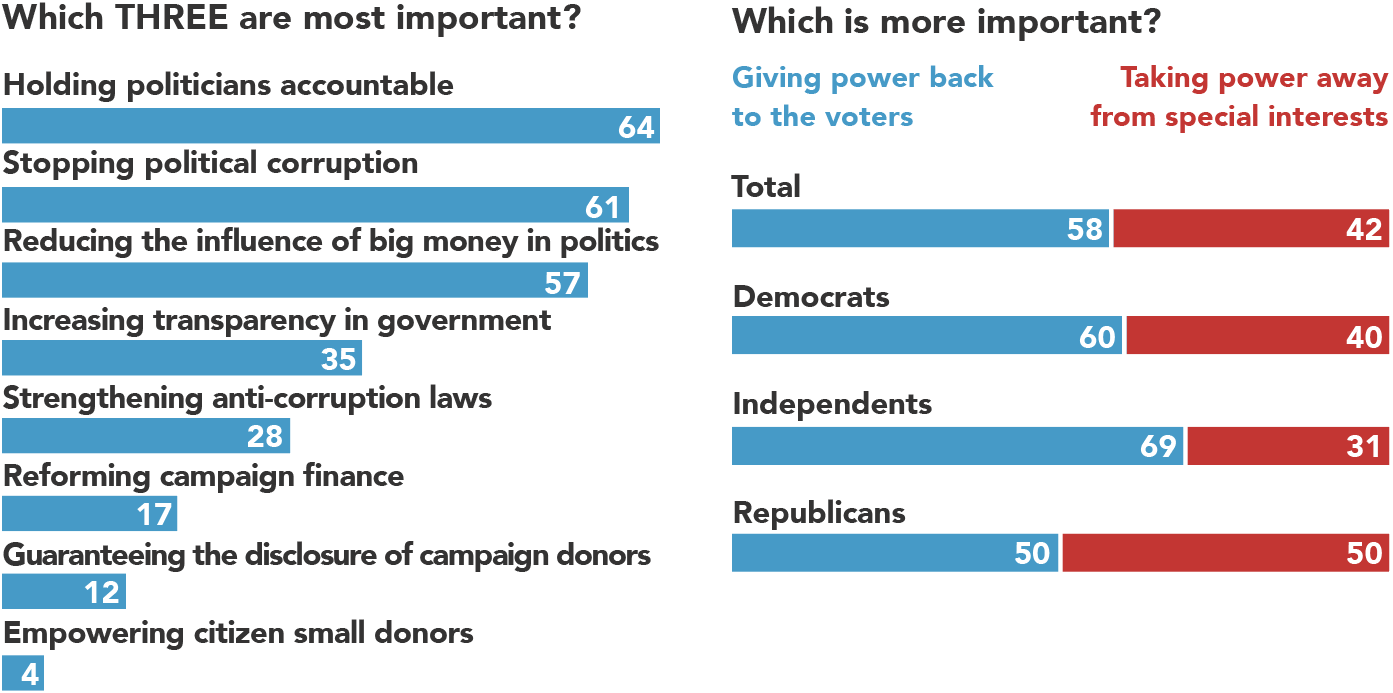
Election security and integrity come first.
For the portions of HR1 focused on campaigning and elections, there are some core principles that rise to the top for Americans: namely, integrity, security, and, to a lesser extent, fairness. Generally speaking, Americans across the political spectrum are particularly interested in protecting voters’ rights.
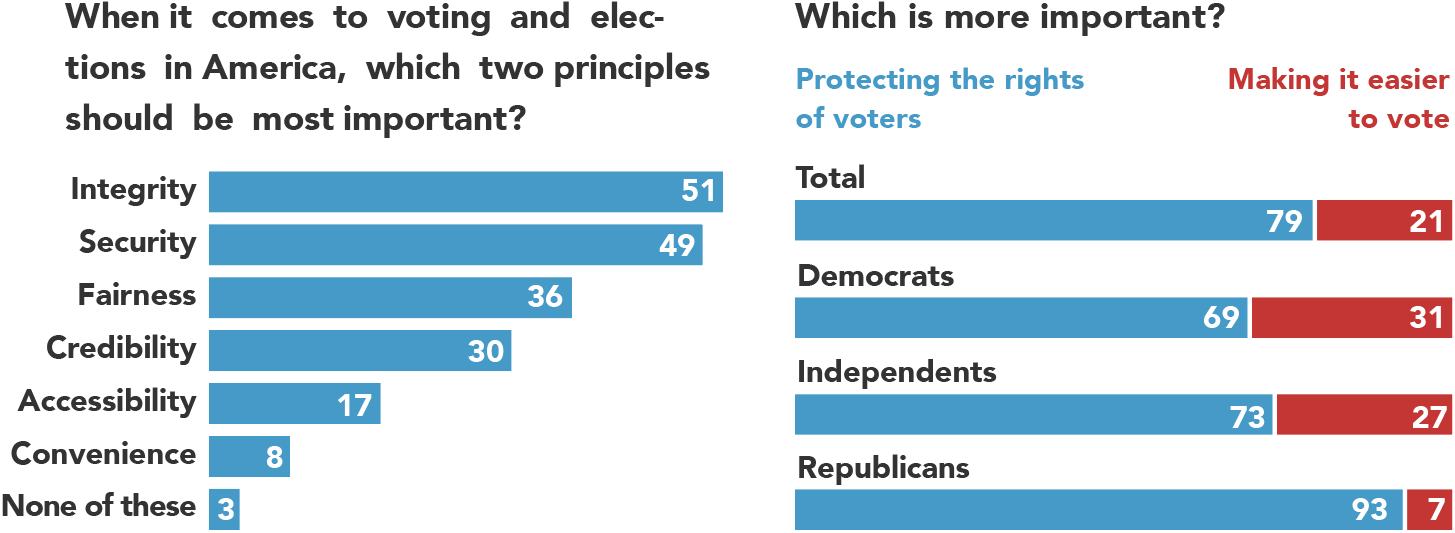

2 | Trump and the Economy
Americans still feel good about “THE” economy, but not “THEIR” economy.
Fifty-eight percent of Americans say the state of the economy is “good” (52%) or “excellent” (6%), a sentiment that likely drives President Trump’s approval rating on the economy to 46% approve, 49% disapprove – markedly better than his overall job approval (38% approve, 55% disapprove).
While people may give Trump credit for the macro-economy, they don’t believe he’s been successful for their personal economy — and that is the message opportunity against him. There is a widespread belief things are getting better for big corporations (55%) and wealthy people (59%). Far below, regular people are not doing so well: more say the economy is getting worse for “people like me” than say it is getting better. Viewed another way, while 40% of Americans say Trump has “helped the economy,” just 23% say he has helped their personal financial situation. This deficit is widest with some of the groups most favorable to Trump: 54% of non-college whites believe Trump has helped the economy, but only half that (26%) believe Trump has helped their own situation.
Additionally, in a split sample experiment, non-college whites believe that Trump’s actions have helped “people like them” by a 21-point margin (43% mostly helped/22% mostly hurt). At the same time, however, non-college whites are 13 points more likely to say the economic situation for “people like them” is getting worse than getting better (19% getting better/32% getting worse).
The wide gap between perceptions of the broader economy and individual experience is a reminder that, even as the president touts low unemployment and growth statistics on Twitter, many Americans are not feeling it while they see the wealthy and corporations getting further ahead. The opportunity to win this argument is not to engage in the macro fight but to win the individual, kitchen-table-level debate.
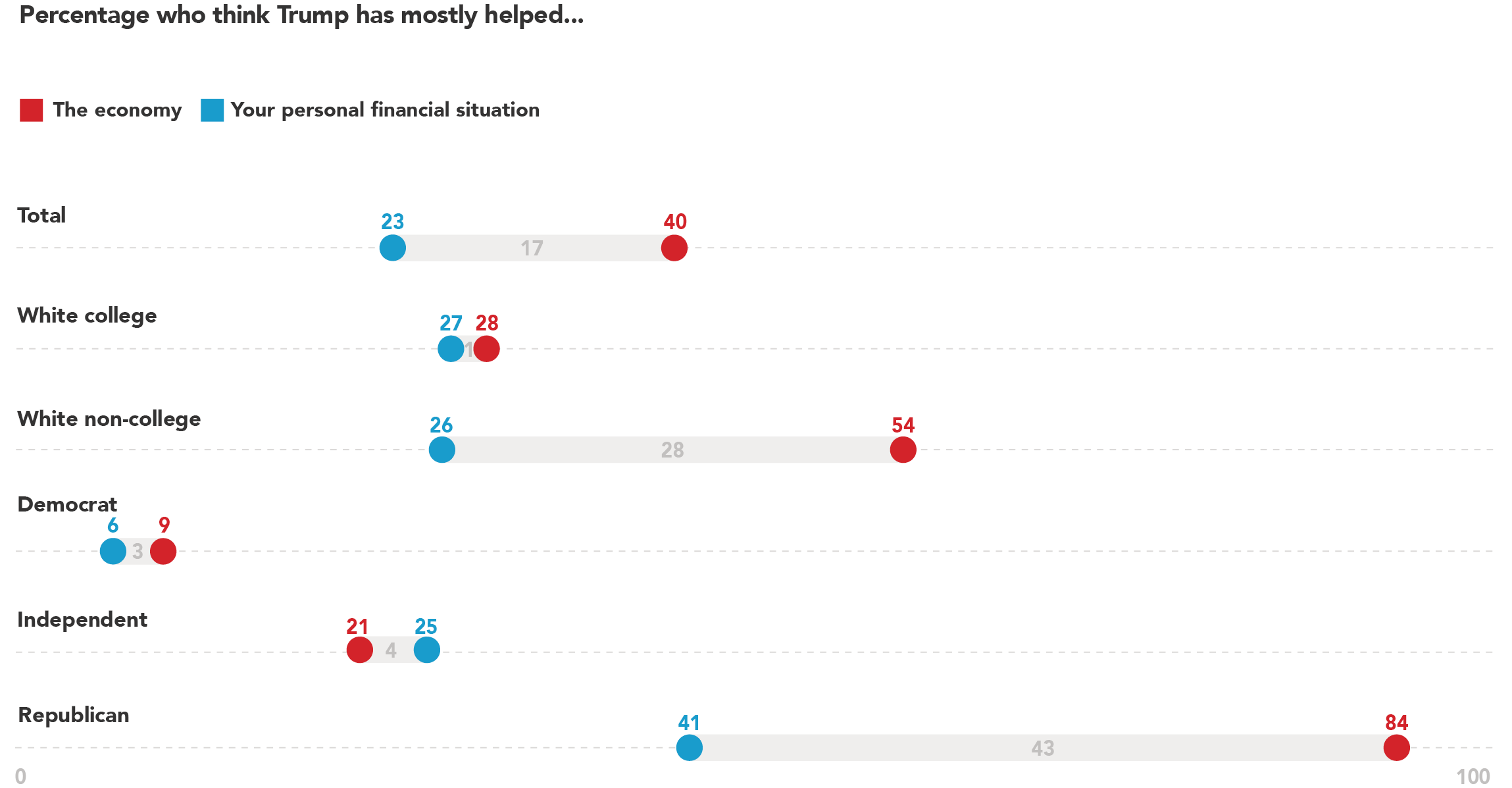
The Trump Economy:
There is a strong relationship between perceptions of how well a group is doing on the one hand, and how much Trump has personally helped that group on the other. One mismatch: people tend to believe Trump has helped investors in the stock market, but on balance, they also think things are getting worse for investors today.
Perceived winners in the Trump economy: the wealthy, big corporations, lobbyists, and American manufacturers.
Americans see the “middle class” as the group losing the most in the Trump economy, with 23% believing the middle class’s economic situation is getting better and a plurality (42%) believing things are getting worse for the middle class. The public’s outlook is not quite as negative when they are asked about other common labels for average Americans, such as “people who work for a living” (28% getting better/35% getting worse) or “people like you” (21% getting better/33% getting worse).
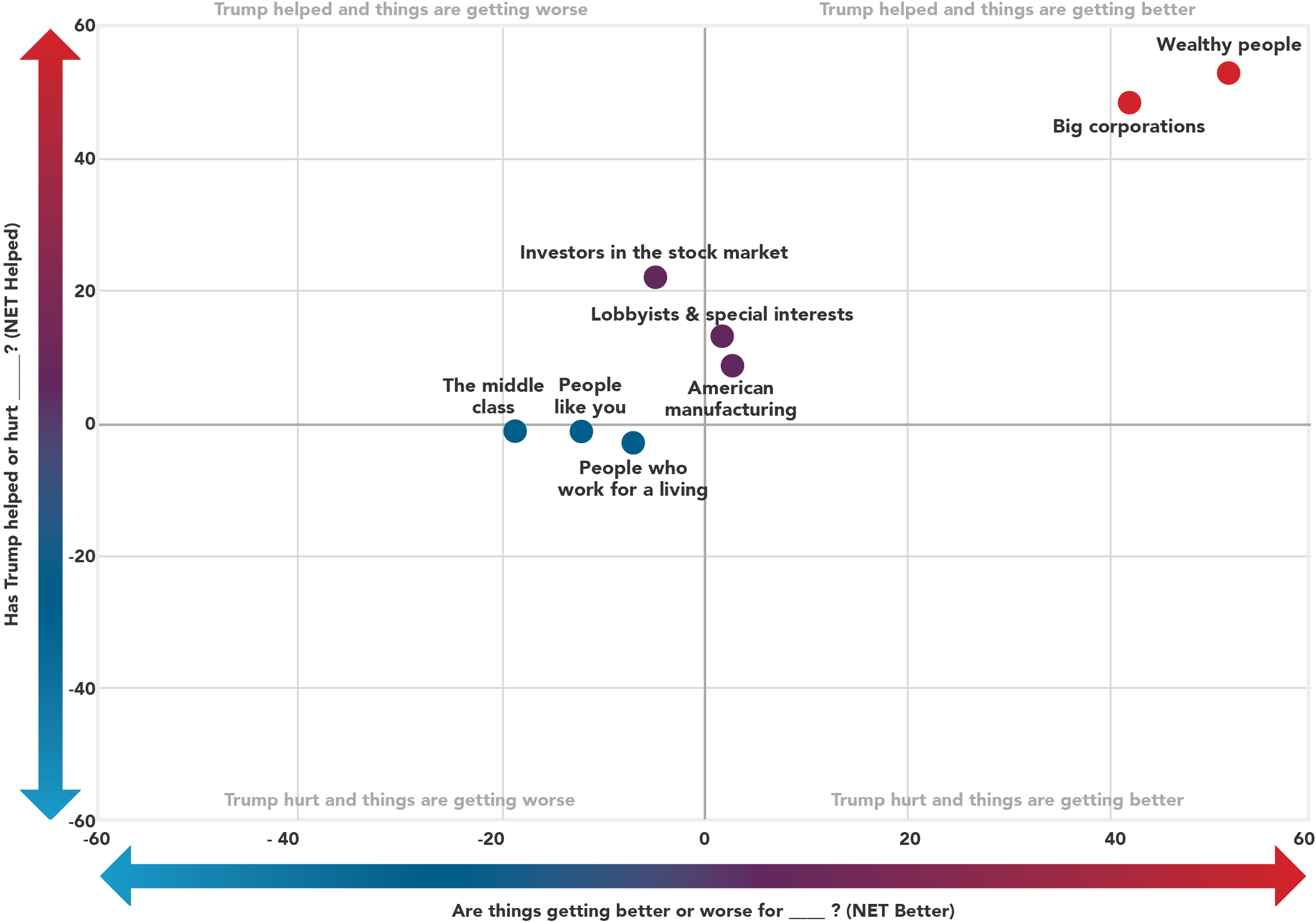
A Note on the Economy: This survey was conducted in mid-December, during a period of volatility in the stock market.
3 | The Special Counsel Investigation
Obstruction of justice and cover-up remain a bigger concern than collusion.
“No collusion” may be President Trump’s mantra when it comes to the Special Counsel investigation, but the public is not convinced the investigation’s legitimacy should hang on this specific allegation. Just 33% agree “the investigation will be a failure if it doesn’t uncover ‘collusion’ with Russia.” Meanwhile, 61% agree that “Donald Trump thinks he is above the law,” including one in four self-identifying Republicans (25%). Potential obstruction of justice and cover-up by the president remains the most troubling aspect of the investigation for the public — over and above collusion or Russian interference. This mirrors a Navigator finding when the same question was asked in May 2018.
The bigger picture about the Mueller investigation is murkier. Favorable opinions of the Special Counsel investigation have declined slightly to 34% favorable (with 37% unfavorable), down from a September peak of 42% favorable, 30% unfavorable. However, support for continuing the investigation into Trump’s 2016 campaign and Russian election interference has been relatively steady over the same period (52% this month, down from 56% in September but matching 52% in June). And between an argument that the investigation is a witch hunt and after 2 years it is “time to move on,” and an opposing argument that the investigation should continue because it had already made significant discoveries — including some potentially implicating Trump himself — the pro-investigation argument wins 56%-44%, underlining the need for the investigation’s supporters to continue making their case.
Doing so doesn’t require focusing on Trump’s own personal culpability. In a split sample test, a similar argument that the investigation should continue because it has made significant discoveries — including indictments of Trump’s former campaign chairman, former National Security Adviser, and former personal lawyer — beats the “time to move on” argument by 54% to 46%.
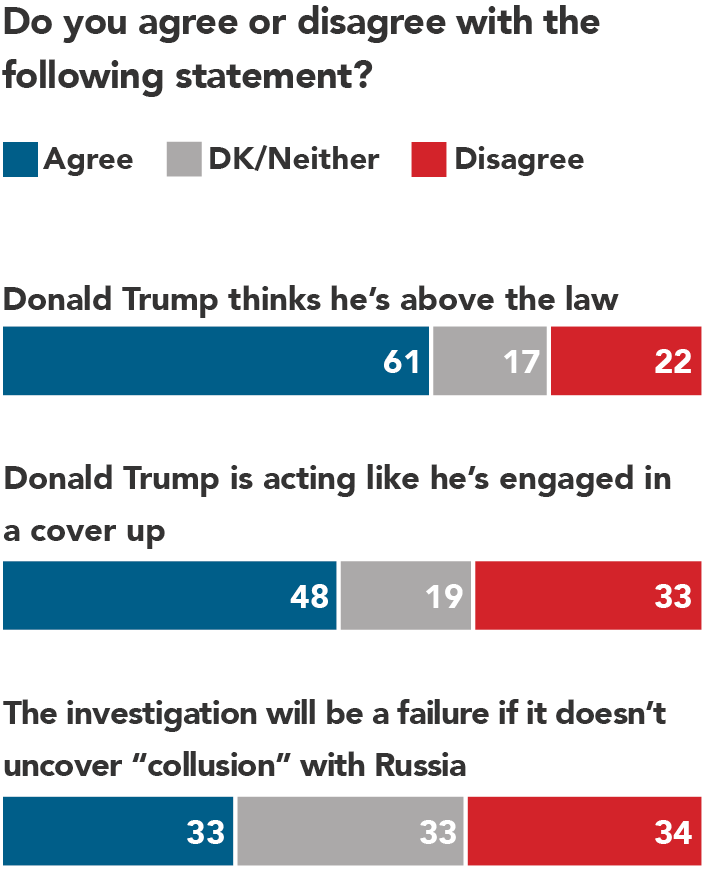
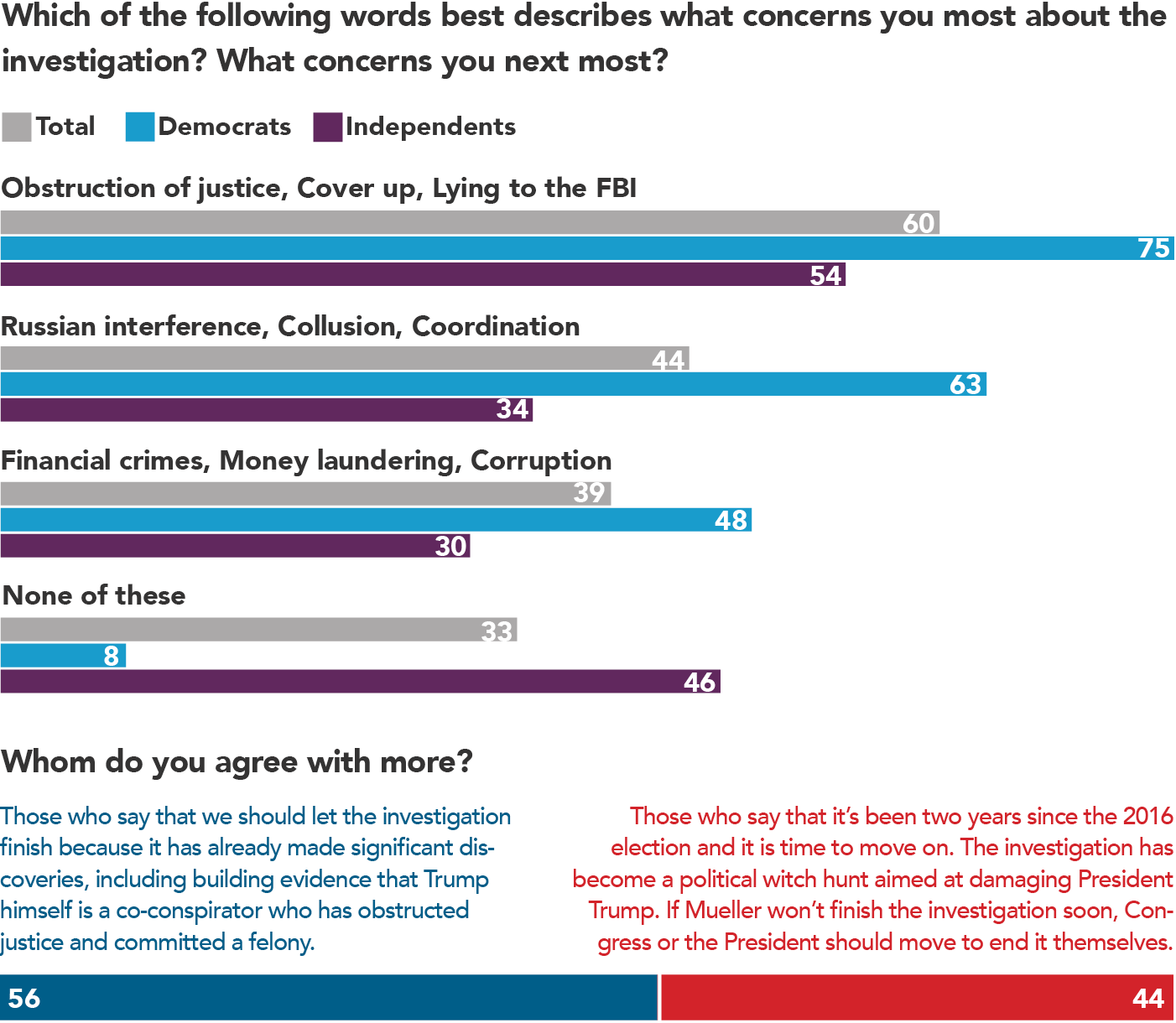
Bonus Points
Dishonesty in the White House
Countless surveys have shown most Americans believe President Trump is dishonest. But the latest Navigator survey finds 52% of the public say Trump lies “more often” than previous presidents, while 12% say he lies less often and 27% say he lies about as often as past presidents. Among Republicans, the top choice is “same as previous presidents.” Next month, Navigator will delve deeper into what Americans think and say about the current president’s relationship with the truth.
Trump Out for Himself, the Wealthy
A majority of Americans believe that Trump wants what is best for himself (56%), rather than what is best for the country (44%). Beneath the surface, there is a deep schism between college educated white voters (69% best for himself/31% best for country) and non-college white voters (37% best for himself/63% best for country). Like most Americans, however, both of these groups agree that Trump’s policies put wealthy people first rather than working and middle class people (69% wealthy people/31% working and middle class people overall, including 70%/30% among college educated white voters and 65%/35% among non-college white voters).
